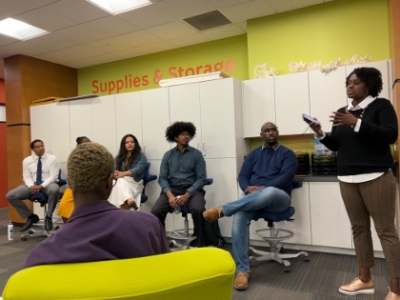Inspiring Change: Students in the Program in Education Find Their Calling to Make a Difference in Education

Assistant Professor of the Practice Kisha Daniels is on a mission. As the new director of Duke’s Secondary Teacher Preparation Program, her job is to let students know that on a campus full of emerging consultants, engineers, and doctors, there’s also a pathway to becoming a teacher.
While many departments at Duke are highly visible, the Program in Education still flies under the radar. It offers a minor for undergraduates who’d like to become elementary and secondary teachers and a Master of Arts in Teaching (MAT) for graduate students seeking their initial licensure in secondary education. There is also an AIG (academically/intellectually gifted) program offered as an add-on for anyone who currently holds a North Carolina teaching license.
“It’s become my mission to make sure that students know Duke has a secondary teacher preparation program, and that teaching is an exciting and viable career option,” Daniels said.
Teaching is a career she knows well. Daniels has a broad and deep background as an educator, starting as a classroom teacher and also working as a school counselor, administrator, and in higher education teaching students how to become teachers.
Daniels has always stressed the importance of challenging herself and learning new skills as an educator. While she was serving as the chair of the Education Leadership Department at North Carolina Central University, she felt the need to get back into the field of public education at the secondary level. She decided to leave academia to work in the schools.
Now back on a university campus, Daniels is bringing together her multitude of experiences to prepare Duke students for careers in the front of the classroom.
“My focus has always been on teacher development, teacher growth and teacher mentorship,” she said. An important component of this is diversifying the cohorts in Duke’s program as much as possible, which benefits both aspiring teachers and their students.
“We know that having diverse teachers positively impacts all students, said Daniels, “but it impacts African American students and students of color. School is hard! All students need teachers who look like them and who have similar cultural, ethnic and life experiences that they can connect to.”
Having recently written two policy briefs with the Hunt Institute/Duke’s Sanford School of Public Policy that focused on the need to increase the diversity in the teaching profession, Daniels is exploring ways to bring these ideas into practice.
She noted that the teaching profession is largely female and white, while K-12 populations in the Durham Public Schools, where Duke students in the Program in Education get hands-on experience, are not. She pointed to a gap between what teachers look like and what students look like. The question she asked is “Are there ways to support increasing diverse teacher recruitment, which positively impacts all students?”
Since she has become director, Daniels has started a new series where she brings in working teachers (many whom she has taught at some point) to talk to prospective students about teaching and why it matters. She hopes to showcase teachers who are diverse and passionate about working with students and give interested students a chance to ask them questions about the field.
So far, what she’s doing is working. Daniels said that this year’s cohort is the most diverse yet.
“As an Education Minor and a Black student considering a career in teaching, it has been extremely helpful to hear and learn from educators who look like me in a field that has historically been dominated by those who don’t, said Jalen Faison, a second-year student who is interested in the program. “Dr. Daniels has been very open about her experience in the field of education and about the opportunities that have come her way as a result of being an educator.”
Maria Lin, a current third year in the program, said she took Education 101 out of curiosity, and learning more about the history of the education system in the United States inspired her to seek out teaching as a career.
“Growing up, I was never exposed to diverse student populations and held a very one-dimensional belief that academic excellence was directly related to intelligence,” said Lin. “My perspective shifted when I took Education 101 and learned about the many ways that the current education system bars students from upward class mobility. With this newfound knowledge, I felt motivated to become a teacher and make a small but meaningful impact on underserved communities.”
Students in the program are inspired to make a change in the current education system. “My teachers were the people who constantly motivated me, supported me, and guided me into who I am today. I want to be a teacher so that I can be that person for someone else,” said junior Nathalia Compresperez, who has been accepted into the Teacher Preparation Program and enrolled in the first course in the sequence.
Daniels said that many students don’t realize they’re already well-equipped to be a teacher, and that Duke’s Program in Education is available to help reach their goals.
“I like to tell them ‘You might be a good fit for this program if you like science, if you find yourself being drawn to tutoring, if you like giving back to the community, if you feel you learn best when you teach concepts to other people. You might be a great candidate for this program.’ “
Students interested in learning more about the program can reach out to Dr. Daniels at kisha.daniels@duke.edu.
